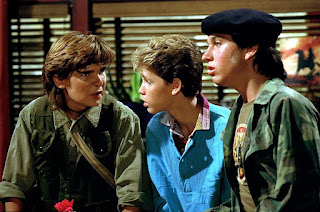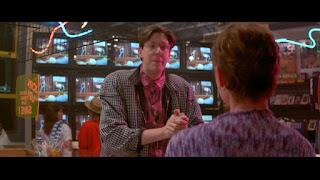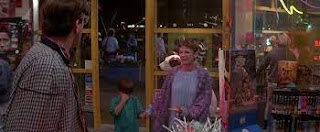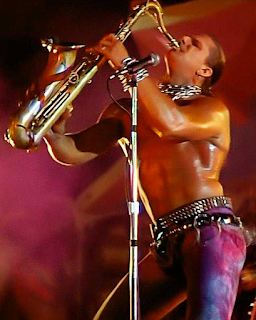Back in the summer of '87, no one would have thought to consider The Lost Boys as a classic. Not that director Joel Schumacher's hip take on vampires wasn't well received, only that its veneer of glossy superficiality made it hard to believe it would leave any lasting (bite) mark on the genre. Produced by Richard Donner and Harvey Bernhard, collaborating again after Bernhard had produced the Donner-directed hits The Omen (1976) and The Goonies (1985), The Lost Boys had an impeccable commercial pedigree and it glowed with a mainstream shimmer in the hands of Schumacher and cinematographer Michael Chapman (Taxi Driver, Raging Bull). While it was not the first vampire movie to adopt the visual language of the MTV era - director Tony Scott's 1981 stylish cult fave The Hunger had gotten there first - The Lost Boys was the first to embrace MTV's attitude and, more importantly, its audience. This was pop horror aimed squarely at the MTV generation.
Prior to The Lost Boys, vampire movies made life as a bloodsucker out to be a curse. The only cinematic vampire who seemed to be having any fun at all was George Hamilton's campy Count of Love at First Bite (1979). The major innovation of The Lost Boys was that it was the first non-spoof to portray the vampire lifestyle as being a blast. Its vampires weren't lonely, brooding figures, they were a gang of buddies who wore the coolest clothes and partied every night. Before The Lost Boys, vampires had been solitary creatures. Even when there was more than one vampire around, as in Brides of Dracula (1960), they weren't chummy with each other and they didn't possess any individual autonomy. They were just subservient to whoever turned them and they fed off the scraps their master left behind. But the vampires of The Lost Boys weren't stuck sulking in a castle begging for leftovers. They were out having a good time.
Director Kathryn Bigelow's Near Dark, released later that year, also featured a pack of vampires but the vagabond crew of Near Dark, while tight-knit, led a much more hard scrabble, skin of their fangs existence than that of the Lost Boys. The words "Sleep all day. Party all night. Never grow old. Never die. It's fun to be a vampire." would not have fit quite as well on the poster for Near Dark as they did on that of The Lost Boys. Not that the nocturnal family of Near Dark didn't have their own brand of fun but, for the most part, they did not have the same glamour or youthful sexiness of The Lost Boys. Right when we first meet the vampires of Near Dark, they're already looking past their expiration dates. The nights have been hard on those guys. On Kiefer Suthlerand's David and his boys, not at all. They're thriving.
The fact that David and his crew are all destroyed at the end of Lost Boys does not feel like a strong condemnation of the choices that put them there. No one ever walked away from watching The Lost Boys thinking that these guys weren't living the life. Sure, Star (Jami Gertz) and Laddie (Chance Michael Corbitt) and Michael (Jason Patric) wanted to opt out of the whole deal but I think the takeaway from that is that being a vampire isn't for everybody. Some people aren't up for it. But if you can hack it, The Lost Boys seems to say, you should absolutely go for it. For their part, David and the boys do not appear to miss their humanity whatsoever. They're having a ball, all the way till the end. They might get killed but they are unrepentant. They like being vampires and Schumacher and screenwriter Jeffrey Boam don't try to convince us that they shouldn't.
At the same time, Schumacher's charismatic young cast - particularly Corey Haim as Sam and Corey Feldman and Jamison Newlander as self-styled fearless vampire killers Edgar and Alan Frog - are able to keep their anti-vampire squad personable and funny rather than appearing to be kill joys. The forces traditionally aligned against Dracula - Van Helsing, Jonathan Harker, Dr. Seward and the rest of the righteous men intent on killing the Count - have always felt like the forces of repressed male Victorian society protecting their world against an element of raw passion and sexuality that will, unless stopped, seduce (and liberate) their women. The Frog Brothers are uptight in their own way but their hard line against the bloodsuckers seems motivated by civic duty rather than by any puritanical impulses. They're not against pleasure, as we suspect Van Helsing and his crew are, they just see vampires as an infestation that needs to be purged.
Keep in mind that the Frog Brothers are part of the business community of Santa Clara (you might say they have a stake in its success...ok, maybe you wouldn't). They watch over their parent's comic book store so the idea of vampires prowling the boardwalk and feeding off prospective customers is something they would naturally be against. These punk vampires are reckless, they walk around like they own the place and the bottom line is that they need to be dealt with. The Frog Brothers believe in the virtues of capitalism and law and order (if they were old enough to vote, you know they'd have been all in on Reagan and the '80s GOP). They are part of that '80s breed of young conservatives that rejected the free spirit, hippie ethos of their parents (we see their parents passed out in the comic book store, still dressed like it's 1968). If they have to go Rambo on some vampires to keep the boardwalk safe, so be it.
While David is the star vampire of The Lost Boys and the one that obviously gets all the attention, I find head vampire Max (Edward Hermann) to be a more interesting figure to try and wrap my head around. We only find out that Max is a vampire in the film's final scenes and he is staked almost immediately afterwards but I have so many questions about this guy. For starters, I have to imagine that, even in vampire circles, there's some kind of unspoken code of conduct and I gotta believe that trying to get to a woman through her children is considered to be crossing a line. Even for a bloodsucking ghoul, it's such a cheap move. Unlike most vampires, who are driven by their sensuality and by centuries' old romantic longings, Max doesn't seem to have any burning lust for Lucy (Dianne Wiest), he's more interested in finding a suitable mother figure to get his pack of unruly vampires in line. He claims he still wants Lucy even after the deal with David goes south but I don't buy it. Max is for sure never going to tell Lucy that he crossed oceans of time to be with her. He's just hoping she's in the mood to settle.
When Max looks at what David and the rest of the boys are up to every night, does he really think being a counter jockey renting out videos is the best use of his undead existence? If he was operating a cool little indie movie house, sure. There's a romance to that. You can definitely see how a vampire would fall in love with screening cult films for the midnight crowd. Collecting late fees on overdue copies of Short Circuit, though, not so much. This guy could do far better with what he has to work with is what I'm saying.
During their first meeting, after Max has ordered David and the boys out of his store, Lucy says to Max "Oh, they're just young. We were that age too, once." But in Max's case, I'm not so sure. If this guy was ever young, he must not have had dreams.
As Sam says, to Hell with Max.
For a movie that initially seemed to be chasing the trends of the time, the biggest tribute to The Lost Boys is that it continues to be an ongoing influence that has redefined the depiction of vampires in popular culture. What in 1987 seemed like nothing more than lightweight summer fare proved to be a game changer. Not every great horror movie is about breaking taboos or being transgressive. Sometimes great horror movies are simply about providing fun and escapism and The Lost Boys is the quintessential example of that.
35 years later, its legions of fans still believe.













No comments:
Post a Comment